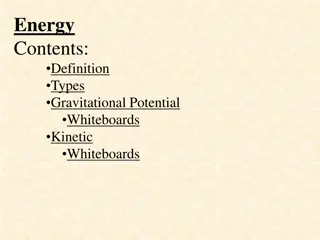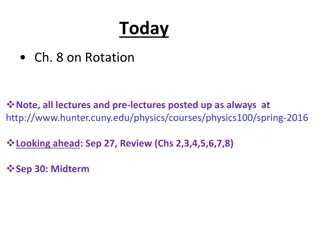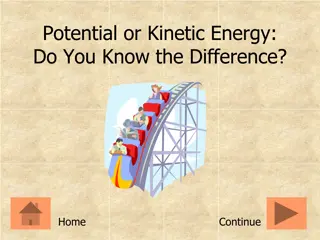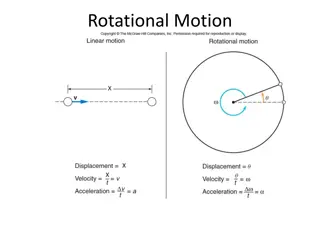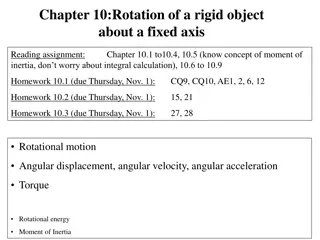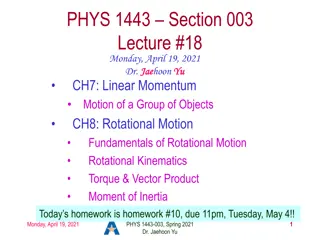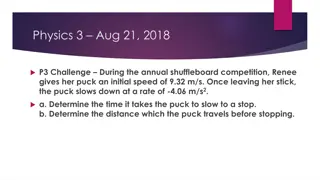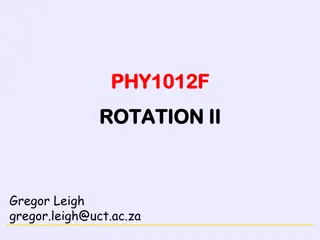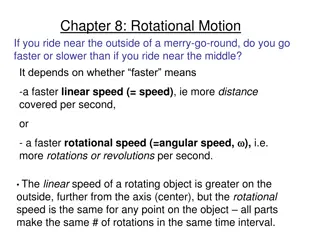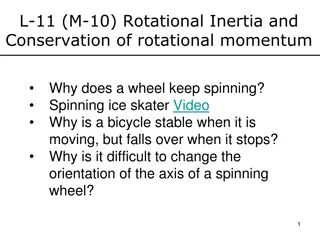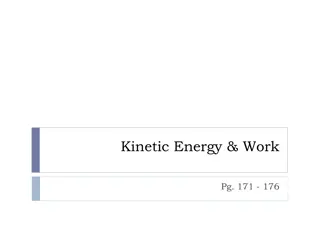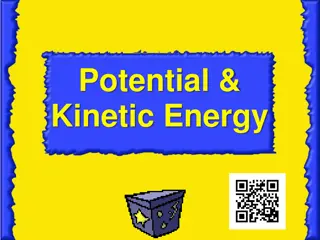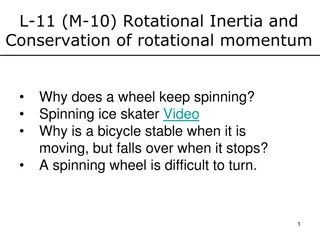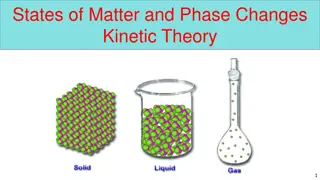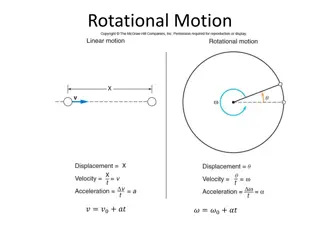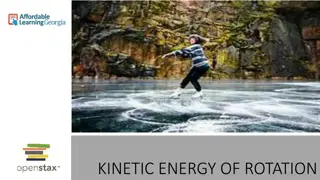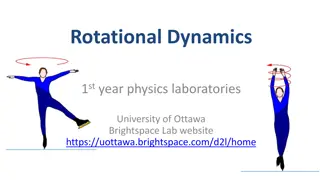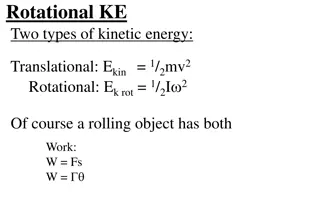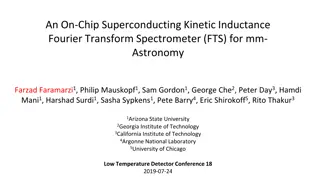Energy: Types, Potential, and Kinetic
Dive into the world of energy with a comprehensive guide covering the definition, types, and characteristics of gravitational, potential, and kinetic energy. Explore how energy is the driving force behind all work and movement, with examples and explanations provided for each energy type. Gain insig
7 views • 24 slides
Rotational Motion in Physics
Exploring rotational motion concepts in physics, including the relationship between linear and rotational speed on rotating objects like merry-go-rounds and Ferris wheels. Learn about tangential speed, angular speed, and the principle of rotational inertia that explains why objects tend to keep rota
6 views • 29 slides
Energy - Forms, Calculations, and Applications
Explore the concept of energy through various images, including forms of energy, kinetic versus potential energy, and calculations involving kinetic and potential energy. Learn about identifying energy states, calculating kinetic energy, and solving physics problems related to energy transfer. Dive
7 views • 27 slides
Potential and Kinetic Energy
Explore the difference between potential and kinetic energy, learn how they are defined, understand their conversion, and discover how they relate to speed, height, and mass in objects around us. See examples of potential and kinetic energy in action, from airplanes circling to flags blowing in the
0 views • 31 slides
Rotational Motion and the Radian
Rotational motion involves rotation around a fixed axis, while the radian measures angular displacement. The relationship between translational and rotational motion is explored, defining angular velocity and differentiating between clockwise and counterclockwise rotations. Examples illustrate the c
1 views • 23 slides
Rotational Motion in Physics
Exploring rotational motion in physics involves understanding angular velocity, torque, moment of inertia, and rotational kinetic energy. This comprehensive guide covers concepts such as the conversion between degrees and radians, angular variables, Newton's second law for rotating bodies, and momen
1 views • 18 slides
Rotational Motion in Chapter 10
Exploring the concepts of rotational motion in a rigid object, focusing on angular displacement, velocity, acceleration, torque, and moment of inertia. Key topics include angular quantities, relationships between linear and angular motion, and applications in calculating rotational parameters. Pract
0 views • 29 slides
Linear and Rotational Motion in Physics
Explore the concepts of linear momentum, center of mass, rotational motion, and angular displacement in physics. Learn how to determine the center of mass of objects, analyze motion of particle groups, and understand the conservation of momentum in systems under external forces. Delve into the funda
5 views • 18 slides
Introduction to Rotational Motion in Physics
Explore the concepts of rotational motion in physics, including angular displacement, angular velocity, and angular acceleration. Understand how objects move in circular paths and learn about the relationships between linear and rotational variables. Dive into the study of extended bodies and the dy
1 views • 15 slides
Kinetic and Potential Energy: A Visual Exploration
Delve into the concepts of kinetic and potential energy through engaging visuals and explanatory content. Learn about the factors affecting kinetic energy, compare energy levels between objects in motion, explore the calculation of kinetic energy, and discover the storage and examples of potential e
0 views • 15 slides
Rotational Motion in Physics
Covering concepts of rotational motion including angular displacement, velocity, acceleration, and kinematics, this content explores how objects rotate and the related variables. By delving into the dynamics of rotating bodies, readers can grasp the principles underlying rotational motion.
3 views • 16 slides
Energy: Kinetic and Potential Explained
Explore the concepts of kinetic and potential energy through illustrations and examples. Learn how kinetic energy is influenced by mass and speed, and how potential energy can be stored in different forms such as gravitational, chemical, and elastic. Understand the relationship between mass, speed,
4 views • 12 slides
Different Forms of Energy and Work in Physics
Energy in physics is the capacity to do work, and there are various forms of energy such as radiant energy, kinetic energy, gravitational potential energy, elastic potential energy, chemical potential energy, nuclear potential energy, electrical potential energy, thermal energy, and sound energy. Ea
33 views • 47 slides
Conservation Laws in Rotational Energy
Explore the concept of conservation laws in rotational energy, delving into the principles of mechanical energy and angular momentum conservation to solve rotational problems. Learn how to apply vector mathematics, kinetic energy formulas, and potential energy variations in frictionless systems. Mas
1 views • 18 slides
Rotational Motion: Linear vs. Angular Speed
Exploring the concept of rotational motion, this content delves into the comparison between linear speed (tangential speed) and rotational speed (angular speed). It discusses how the linear speed varies based on distance from the axis of rotation, while the rotational speed remains constant for all
6 views • 27 slides
Rotational Inertia and Conservation of Momentum
Rotational inertia symbolized as I is crucial in quantifying the torque needed for rotation, depending on mass distribution. Torque, rotational inertia, and mass influence an object's spinning motion, affecting stability and speed. Exploring why wheels keep spinning, ice skaters rotate faster when a
1 views • 23 slides
Kinetic Energy and Work in Physics
Kinetic energy is the energy possessed by moving objects, allowing them to do work. When a force acts on an object causing it to displace, work is done, and the object's kinetic energy changes. The work-energy theorem states that work done on an object equals the change in its kinetic energy. Real-w
4 views • 9 slides
Kinetic and Potential Energy
Explore the relationship between potential and kinetic energy, as well as how energy causes change in objects. Learn about kinetic energy, speed, mass, and their impact on energy transfer through engaging examples and explanations.
4 views • 32 slides
Rotational Inertia and Torque in Physics
Rotational inertia symbolizes how difficult it is to change the rotation of an object. It depends on mass distribution from the axis, shape, and mass. Torque needed to start rotation is proportional to rotational inertia. Smaller rotational inertia leads to faster rotational acceleration. Examples a
5 views • 23 slides
Kinetic Theory of Matter and Phases
Explore the fundamental concepts of the Kinetic Theory of Matter, including the three pillars of kinetic energy and forces of attraction, which determine the states of matter like solid, liquid, gas. Learn about temperature, phase changes, and the phases of matter, emphasizing the role of kinetic en
2 views • 17 slides
Energy: Potential and Kinetic Forms in Grade 7 Natural Sciences
Energy in various forms is explored in Grade 7 Natural Sciences, with a focus on potential and kinetic energy. Energy is the ability to do work and exists in different types like heat, chemical, electromagnetic, nuclear, and mechanical. The sun serves as a primary energy source. Potential energy is
2 views • 11 slides
Rotational Motion and Angular Variables in Physics
Exploring rotational motion in physics, including the definition of angles in radians, conversion between degrees and radians, angular variables, torque, Newton's second law for rotating bodies, moment of inertia, rotational kinetic energy, and angular momentum. Learn about key concepts and equation
6 views • 15 slides
Rotational Kinetic Energy and Moment of Inertia
Rotational kinetic energy arises from the motion of mass in a rotating object, while moment of inertia quantifies an object's resistance to rotational motion. This concept is crucial for analyzing the energy and stability of rotating systems. The content explains the calculation of kinetic energy fo
6 views • 7 slides
Rotational Dynamics in Physics
General announcements for a physics class covering topics on rigid bodies, torque, moment of inertia, and rotational Newton's second law. Learn about the importance of moment of inertia, calculating rotational inertia, and the application of Rotational N2L in problem-solving exercises. Explore the r
6 views • 21 slides
Experimental Determination of Moment of Inertia in Rotational Dynamics Lab
In this university lab experiment, students apply known torques to various objects to measure angular accelerations and determine their moments of inertia. The setup involves rotating discs and rods with masses, using a rotational sensor for data collection. Important steps include measuring diamete
3 views • 12 slides
Rotational Kinetic Energy
Learn about the principles of rotational kinetic energy, including translational and rotational components. Solve problems involving kinetic energy, work, and angular velocity. Explore concepts through examples and whiteboards. Understand how to calculate the total kinetic energy and work done in ro
5 views • 9 slides
Grade 7 Energy and Change: Potential and Kinetic Energy
Potential and kinetic energy are explored in Grade 7 Natural Sciences, focusing on the law of conservation of energy. The flow diagrams illustrate energy transfer processes, such as from potential to kinetic energy in examples like a bent ruler, water wheel, toy car, and electrical toy car. Understa
0 views • 7 slides
Exploring Energy: Potential vs. Kinetic Concepts
Dive into the concepts of potential and kinetic energy through labs, lectures, and discussions. Get ready for quizzes and tests on potential and kinetic energy, with opportunities for retakes. Understand the equations, types, and measurements associated with energy in motion. Explore real-world exam
0 views • 12 slides
On-Chip Superconducting Kinetic Inductance Fourier Transform Spectrometer for mm-Astronomy
This innovative on-chip spectrometer offers a compact solution for mm-wave astronomy research, utilizing superconducting kinetic inductance technology. Learn about the motivation behind its development, the concept of kinetic inductance in superconductors, and the advancements in non-linear kinetic
2 views • 11 slides
Collision Scenarios and Kinetic Energy Analysis
In these scenarios, different air track gliders and objects collide head-on, resulting in their velocities and kinetic energy changing. The post-collision speeds and the lost kinetic energy are calculated for each scenario. Additionally, a bullet collides with a block of wood, leading to an evaluati
4 views • 17 slides
Conservation of Mechanical Energy Explained
Explore the concept of conservation of mechanical energy in Chapter 6, including kinetic energy, potential energy, and various forms of energy. Learn about the law of conservation of energy and its application to different systems, as well as conserved quantities like mass, momentum, and charge. Dis
5 views • 17 slides
Gas Behavior: Boltzmann Distribution and Kinetic Energy
Explore the concepts of Boltzmann distribution, average particle speed, average kinetic energy, and internal energy of a gas. Learn how statistical mechanics describes the distribution of particle speeds in an ideal gas and the relationship between kinetic energy, temperature, and pressure. Discover
0 views • 7 slides
Derivation of Fundamental Equation Kinetic Theory and Kinetic Molecular Theory
Explore the derivation of the fundamental equation of the kinetic theory and the kinetic-molecular theory, discussing the number of molecules in a gas, their masses, movements, collisions, impulses, and the resulting pressure in the system. Discover how kinetic energy is derived based on temperature
1 views • 33 slides
Kinetic Energy Principles
Dive into the world of kinetic energy, work, and total mechanical energy. Learn how to calculate kinetic energy, solve sample problems, and understand the relationship between motion and energy in objects.
0 views • 6 slides
Understanding Moments of Inertia and Kinetic Energy in Mechanics
Concepts of moment of inertia, rotational motion, and kinetic energy through scenarios involving bars, balls, and objects rolling down hills. Understand the relationships between mass, length, speed, and energy in various mechanical systems.
0 views • 5 slides
Understanding Rotational Inertia and Its Mathematical Relationship
Learn about rotational inertia, also known as moment of inertia, and its significance in physics. Explore the mathematical relationship between a particle's rotational inertia, its mass, and distance from the axis of rotation. Conduct experiments, analyze data, and understand the principles governin
5 views • 6 slides
Understanding Moment of Inertia and Rotational Kinetic Energy
Explore the concept of moment of inertia, rotational kinetic energy, and the proof of the Parallel-Axis Theorem. Learn how these principles relate to rotational motion and energy in physics.
0 views • 8 slides
Understanding Torque, Statics, and Rotational Dynamics in Physics
Delve into the concepts of torque, statics, and rotational dynamics in physics, covering equilibrium conditions, net torque calculations, rotational kinetic energy, conservation laws, and more. Explore the analogies between force and torque, mass and moment of inertia, and linear and angular acceler
0 views • 16 slides
Understanding Energy Transfers and Forms
Explore the world of energy transfers, conservation, and various forms of energy including thermal, light, electrical, sound, kinetic, chemical, nuclear, and potential energy. Learn how energy is conserved and utilized in everyday devices and scientific situations, with a focus on efficiency and ene
1 views • 34 slides
Understanding Rotational Motion in Classical Mechanics
Explore the concepts of rotational motion in classical mechanics, including rigid body motion in body-fixed frames, conversion between reference frames, and symmetric top motion. Dive into moment of inertia tensors, kinetic energy calculations, and angular momentum descriptions in rotating bodies. U
1 views • 26 slides
